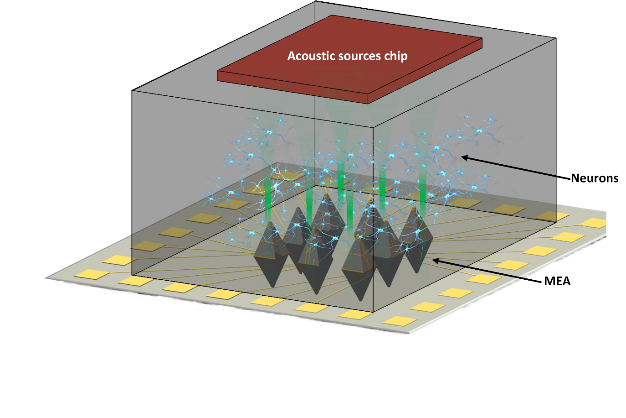MSc thesis project proposal
Integrated Ultrasound Pressure Sensor in a Brain-on-chip Platform
Brain stimulation techniques are essential to address various neurological conditions. Currently, approved neuromodulation techniques are either invasive, requiring patients to undergo a risky surgery, or non-invasive but suffering from low spatial resolution. Focused ultrasound stimulation (FUS) is a promising modality for non-invasive brain stimulation, which was shown capable of eliciting and suppressing neural activity with comparable resolution to invasive modalities.1-2 However, the role of the modulation parameters in FUS is still heavily debated, due to the limited performance of commercial FUS transducers, their inadequate pairing with typical in vivo neuronal recording technologies, and the lack of a systematic approach to studying the effect of ultrasound, as seen by the differences in experimental setups, in parameters used to characterize the ultrasound, and in parameter estimation.
Organ-on-chip (OoC) is an emerging technology that may address this need. OoC utilizes microfabrication techniques to create devices that mimic human physiology in vitro in an organ-specific context to help develop drugs and treatments.3 A brain-on-chip (BoC) approach in particular has the potential to help studying ultrasound more systematically. In this perspective, we aim to develop a BoC platform on a 3D micro-electrode array (MEA). One challenge to be addressed is accurately measuring the acoustic pressure on the cells in situ. Due to the enclosed nature of a MEA, interference in the culture well can alter the ultrasound properties generated by a transducer calibrated in an open space. The mismatch between expectation and reality could lead to an incorrect correlation of parameters and responses.
The aim of this project is to fabricate a miniaturized ultrasound pressure sensor on an MEA. The intended use of the ultrasound pressure sensor, fabricated using microfabrication techniques, is to characterize an ultrasound transducer in situ with cell culture. To that intention, the biocompatibility of the fabricated sensor is imperative to allow for cells to be cultured.
Assignment
The project will be conducted at ECTM with use of EKL facilities.
Project duration can vary from 9 to 12 months.
The assignment includes:
- Design and simulation of the pressure sensor;
- Development of a process flow for the fabrication of the sensor;
- Fabrication of the miniature pressure sensor;
- Characterization of the sensor;
- Reporting.
Daily advisor: Gandhika Wardhana and Shriya Rangaswamy
Requirements
You are an ambitious hands-on master student from microelectronic, mechanical or biomedical engineering, materials science or (applied) physics. You have good communication skills in English, you are independent and proactive, and also a team player.
If you are eager to work in a motivating atmosphere with highly skilled colleagues, then send us your CV!
Contact
dr. Massimo Mastrangeli
Electronic Components, Technology and Materials Group
Department of Microelectronics
Last modified: 2023-11-29
